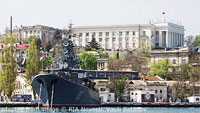Russia denies forcing Ukraine to join Customs Union

(Interfax – MOSCOW, August 29, 2013) Russia denies allegations that it is forcing Ukraine to join the Belarusian-Kazakh-Russian Customs Union and urges the EU not to misinterpret the essence of the matter.
“We are not forcing any decisions on Ukraine, and it is for the Ukrainian leadership and the Ukrainian people to make them on their own. We are being guided by the Ukrainian president’s and government’s statements on their desire to preserve and develop privileged and mutually beneficial economic contacts with the Customs Union countries, strengthen production cooperation with them, and not to lose their share on our market,” Russian Foreign Ministry spokesman Alexander Lukashevich said.
“We are urging the EU not to misinterpret the reality of the situation and make not emotional, but unbiased and economically substantiated judgments concerning scenarios of Ukraine’s socioeconomic development after signing an association agreement” with the EU, Lukashevich said.
“Instead of any arguments, Brussels keeps thinking and trying to persuade others that the further scenario of the development of Ukraine’s trade and economic relations with the Customs Union countries depends solely on Russia’s goodwill. We see this as an attempt to lay the blame at someone else’s door,” he said.
Moscow was “surprised that several high-ranking European Commission officials have lately started accusing our country almost of blackmailing Ukraine and forcing it to join the Customs Union and then the nascent Eurasian Economic Union,” he said.
“In particular, we have taken note of EU High Representative for Foreign Affairs and Security Policy Catherine Ashton’s remarks following her visit to Estonia on August 26 and European Commissioner Stefan Fuele’s statements in Kyiv on August 27. To sum up their essence: Russia is doing all it can to keep Ukraine from signing the beneficial Association Agreement with the EU and to drag Kyiv into the Customs Union by using threats and economic levers,” it said.
“It is revealing that the EU prioritizes not the interests of the Ukrainian citizens but geopolitical reasons and is afraid of losing Ukraine, as Ashton put it,” he said.
“We would like to stress that, unlike the EU politicians persistently criticizing any manifestations of our neighbors’ interest in Eurasian economic integration, we have never been against Ukraine’s ‘European choice’. Moreover, the presidents of Russia, Belarus and Kazakhstan in fact stipulated our own ‘European choice’ in the Declaration on Eurasian Economic Integration of November 11, 2011 by speaking in favor of strengthening comprehensive, mutually beneficial and equitable cooperation with the EU, aiming toward the establishment of a common economic space and mutual harmonization of integration processes in the European Atlantic area and Eurasia,” Lukashevich said.
A draft of the Ukrainian-EU association agreement published recently online makes it evident why the work on this document that lasted years was kept secret to the Ukrainian and international public: “even its superficial analysis shows that it does not contain real benefits for Ukraine but leads to the Ukrainian economy’s de-industrialization, in fact turning it purely into a market for EU goods,” he said.
“It is obvious to economists specializing in international trade that the Ukrainian population is facing extremely hard times in the short- and mid-term: the people would have to tighten their belts and live amid rapidly growing unemployment and worsening balance of trade and balance of payments,” Lukashevich said. “As independent experts see it, the economic effect from the agreement’s implementation will be negative up until 2020, and the manna in the form of inflow of investments, technologies and so on, which the European Union is promising Kyiv in the long term, is not guaranteed by any concrete obligations,” he said.
“What obviously follows from the agreement is that the entry into force of free trade provisions, which, when applicable to Ukraine, go far beyond standard obligations for such agreements, will in fact significantly worsen the conditions of mutual trade between Ukraine and the Customs Union countries,” Lukashevich said.
“Unfortunately, the CIS free trade agreement will be of no help here. In specialists’ view, the Customs Union countries will have to resort to Appendix 6 of this treaty so as to prevent an influx of Ukrainian products ousted by European imports to our markets. And this will be done in line with the WTO rules,” he said.
